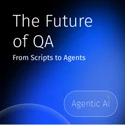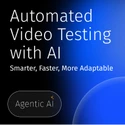- Agentic AI
- AI in video testing and monitoring
- Automated testing and monitoring
Agentic AI in Testing: Beyond the Hype
By Witbe
AI is transforming the way we approach test automation, but not all AI is created equal. The rise of Agentic AI has introduced new possibilities in video testing, promising systems that can design test plans, adapt to UI changes, and identify issues autonomously.
But with rising expectations comes the need for clarity. What can Agentic AI really deliver in QA workflows? Where does it shine? And why does it still require strong tools and expertise to succeed?
Agentic AI: Intelligence with a Purpose
Agentic AI refers to autonomous, goal-driven systems that plan, adapt, and improve over time. In testing, this means agents that don’t just follow static instructions: they pursue objectives, learn from experience, and adjust to app variations in real time.
For video QA, Agentic AI makes it possible to generate test plans from user stories, execute them dynamically across devices, and analyze results, without relying only on scripts. Teams can monitor services across Smart TVs, Android TV, Tizen, Fire TV, mobile apps, and web players, all without rewriting tests for every UI change.
However, this autonomy is reliant on having the right infrastructure and expertise in place.
It’s Not Magic: Agentic AI Needs the Right Foundations
Agentic AI isn’t magic; it needs the right ecosystem to thrive. At Witbe, we’ve seen how powerful it can be when it’s paired with:
- Real testing infrastructure – actual devices in real-world conditions
- Reliable automation – Mature algorithms like VQ-MOS for visual quality
- Observability – full visibility into metrics, visuals, and history
- QA expertise – to define KPIs and refine accuracy over time
Without these, even the smartest AI risks becoming just another black box: impressive, but unpredictable and difficult to trust.
The Promise (and Pain) of Smarter Testing
Agentic AI can absolutely accelerate QA cycles and expand test coverage. But it’s not a shortcut. These intelligent agents still need guidance, validation, and ongoing refinement, especially when working with fast-changing video apps, third-party ads, or DRM-protected content.
At Witbe, our engineers ensure Agentic AI evolves in step with real-world deployments. Agents learn from production data. UI engines adapt to new patterns. Results are validated against actual user experience baselines.
The promise is not to “replace” QA, but to empower it with scalable, adaptive automation that improves over time.
Agentic AI in Practice: Witbe’s Multi-Agent System
Witbe’s Agentic AI was built for the realities of modern video services. It includes:
- Designer Agent: Turns user stories into test plans
- Runner Agent: Runs adaptive, exploratory tests on real devices
- Analyst Agent: Classifies issues, compares results to history, and integrates feedback
Together, these agents help providers launch, monitor, and validate services faster: across platforms like Tizen, Android TV, Roku, Apple TV, iOS, and more; while keeping full control over quality standards.
Smarter Testing Starts with the Right Foundation
Agentic AI represents a major step forward in test automation, but it works best when paired with real infrastructure, clear metrics, and QA expertise.
At Witbe, we’ve built our Agentic AI to work in real-world video environments, with the devices, tools, and intelligence needed to deliver reliable results.
Beyond the hype, that’s what makes the difference.



